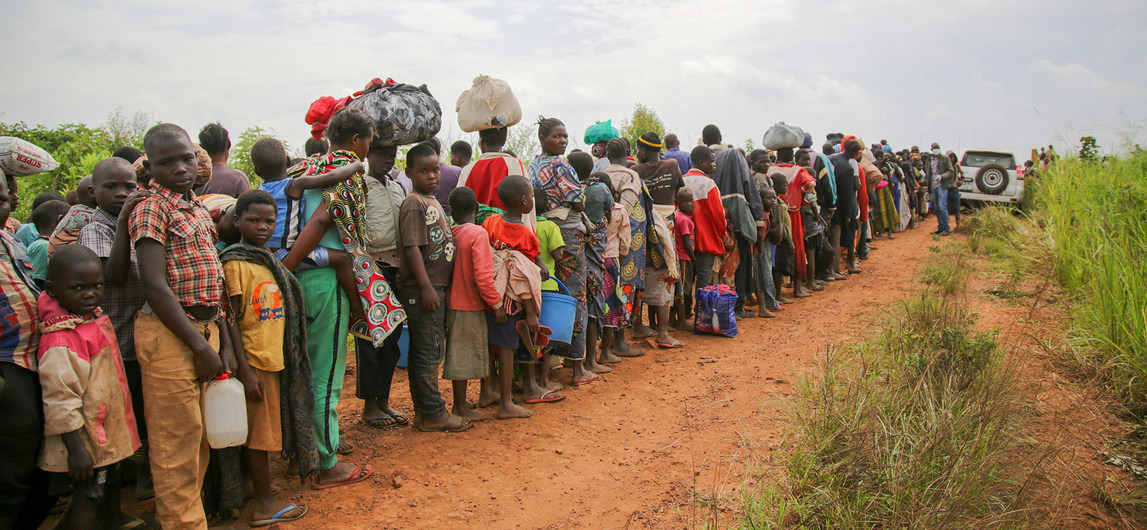
Congolese asylum-seekers line up to undergo security and health screening in Zombo, near the border between Uganda and the Democratic Republic of Congo.© UNHCR/Rocco Nuri
United Nations, June 21 (RHC)-- The number of people fleeing wars, violence, persecution and human rights violations, rose last year to nearly 82.4 million people, a further four percent increase on top of the already record-high of 79.5 million, recorded at the end of 2019.
According to the UN Refugee Agency flagship Global Trends Report, the restrictive COVID-19 pandemic did not slow forced displacement around the world, and instead could have left thousands of refugees and asylum seekers stranded and vulnerable.
When considering only international displacement situations, Syria topped the list with 6.8 million people, followed by Venezuela with 4.9 million. Afghanistan and South Sudan came next, with 2.8 and 2.2 million respectively.
Turkey continued to host the largest number of refugees with just under 4 million, most of whom were Syrian refugees (92%). Colombia followed, hosting over 1.7 million displaced Venezuelans.
Germany hosted the third-largest population – almost 1.5 million, with Syrian refugees and asylum-seekers as the largest group (44%). Pakistan and Uganda completed the top-5 hosting countries, with about 1.4 million each.
The COVID-19 crisis also hit the forcibly displaced hard, who faced increased food and economic insecurity as well as challenges to access health and protection services.
At the peak of the last year, over 160 countries had closed their borders, with 99 States making no exception for people seeking protection.
According to UNHCR, the dynamics of poverty, food insecurity, climate change, conflict and displacement are increasingly interconnected and mutually reinforcing, driving more and more people to search for safety and security.
UNHCR is urging world leaders to step up their efforts to foster peace, stability and cooperation in order to halt and begin reversing nearly a decade-long trend of surging displacement driven by violence and persecution.
“Behind each number is a person forced from their home and a story of displacement, dispossession and suffering. They merit our attention and support not just with humanitarian aid, but in finding solutions to their plight”, reminded the UN High Commissioner for Refugees, Filippo Grandi.
In a statement, Mr. Grandi underscored that while the 1951 Refugee Convention and the Global Compact on Refugees provide the legal framework and tools to respond to displacement, a much greater political will is needed to address conflicts and persecution that force people to flee.
“The tragedy of so many children being born into exile should be reason enough to make far greater efforts to prevent and end conflict and violence,” he added.
Girls and boys under the age of 18 account for 42 percent of all forcibly displaced. They are particularly vulnerable, especially when crises continue for years.
New UNHCR estimates show that almost one million children were born as refugees between 2018 and 2020. Many of them may remain refugees for years to come.
The agency emphasized that over the course of 2020, some 3.2 million internally displaced and just 251,000 refugees returned to their homes –a 40 and 21 percent drop, respectively, compared to 2019. Another 33,800 refugees were naturalized by their countries of asylum.
Refugee resettlement registered a drastic plunge with just 34,400 refugees resettled, the lowest level in 20 years – a consequence of a reduced number of resettlement places and COVID-19.
“Solutions require global leaders and those with influence to put aside their differences, end an egoistic approach to politics, and instead focus on preventing and solving conflict and ensuring respect for human rights,” urged Grandi.
The UN Refugee agency reminded that 2020 is the ninth year of uninterrupted rise in forced displacement worldwide. There are twice as many forcibly displaced people than in 2011 when the total was just under 40 million.

